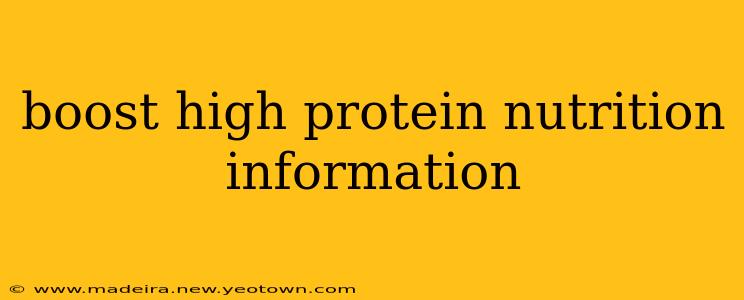Let's be honest, we've all been there. That afternoon slump hits, your energy levels plummet, and you're reaching for anything that offers a quick fix. But what if that quick fix could also be a powerful boost to your overall health and well-being? The answer, my friends, might be more protein. This isn't just about building bigger muscles; sufficient protein plays a crucial role in everything from maintaining healthy bones to supporting a robust immune system. This guide delves into the world of high-protein nutrition, exploring how to incorporate it effectively into your daily life.
What are the benefits of a high-protein diet?
A high-protein diet isn't just about bulky biceps. The benefits extend far beyond aesthetics. Protein is the building block of life, crucial for repairing and building tissues, making enzymes and hormones, and even supporting healthy brain function. Think of it as the fuel that keeps your body's engine running smoothly. Consuming enough protein can lead to increased satiety, helping with weight management, improved muscle mass and strength, enhanced athletic performance, and a stronger immune system. It's a powerhouse nutrient that deserves a place of honor in your diet.
How much protein do I need daily?
This is a question with no one-size-fits-all answer. Your individual protein needs depend on several factors, including your age, activity level, and overall health goals. Generally, the recommended daily allowance (RDA) for protein is 0.8 grams per kilogram of body weight. However, for athletes, those aiming to build muscle, or individuals recovering from illness or injury, this number is significantly higher, often ranging from 1.2 to 1.6 grams per kilogram of body weight. Consult with a registered dietitian or healthcare professional to determine the ideal protein intake for your specific circumstances. They can help you create a personalized plan that aligns with your individual needs and goals.
How can I increase my protein intake without eating a lot of meat?
Many people associate high-protein diets with large amounts of red meat. But fear not, vegetarians and vegans, there are plenty of plant-based options to help you hit your protein goals. Legumes (beans, lentils, chickpeas), tofu, tempeh, quinoa, nuts, and seeds are all excellent sources of protein. Combining different plant-based protein sources throughout the day can ensure you're getting a complete profile of essential amino acids.
What are some good sources of high-protein foods?
The beauty of high-protein nutrition lies in its versatility. Lean meats like chicken breast and fish (salmon, tuna), eggs, Greek yogurt, dairy products (cheese, milk), and various plant-based sources mentioned earlier all contribute to a well-rounded protein intake. Don't be afraid to experiment and find the foods you enjoy the most – variety is key to maintaining a sustainable and enjoyable high-protein diet.
What are the potential risks of consuming too much protein?
While protein is essential, consuming excessive amounts can have potential downsides. These can include kidney problems (especially for individuals with pre-existing conditions), dehydration, increased calcium excretion (potentially impacting bone health), and digestive issues like constipation or diarrhea. Moderation is always key. Aim for a balanced approach, integrating protein into a broader healthy diet rich in fruits, vegetables, and whole grains.
How can I track my protein intake?
Tracking your protein intake can be surprisingly easy in today’s digital age. Numerous mobile apps are available to help you monitor your macronutrient intake, including protein. Many apps allow you to scan barcodes or search for foods to easily log your consumption. This can be particularly helpful when you're first starting to increase your protein intake and are trying to determine how much you’re currently eating.
In conclusion, boosting your protein intake can significantly improve your health and well-being. Remember to consult a professional for personalized guidance, and prioritize a balanced approach to ensure optimal results and avoid any potential negative consequences. The journey to a healthier you starts with understanding your nutritional needs, and protein plays a crucial role in this journey.

